Far about 2 km from city center to the northwest, Vinh Nghiem Pagoda is an important pilgrimage center of Buddhists in the city and also one of the most famous pagodas in Ho Chi Minh City. The pagoda started its construction in 1964 under the control of Monk Thich Tam Giac and Monk Thich Thanh Kiem. Its overall architecture was designed by architect Nguyen Ba Lang with the collaboration of architect Le Tan Chuyen and Co Van Hau. The pagoda owns the ancient architecture style in the North but modern technique and building materials. It is a typical work for Vietnamese Buddhist architecture in the 20th century and also one of the most attractive tourist attractions in Ho Chi Minh City.
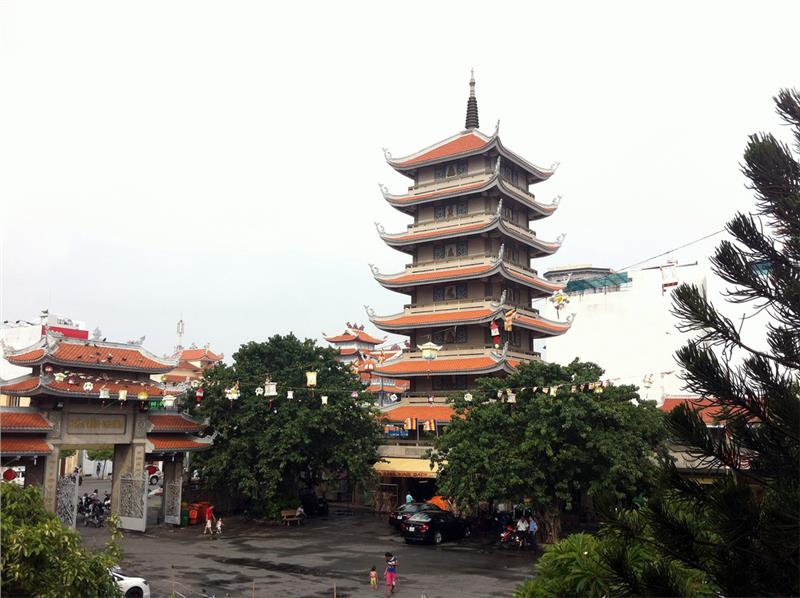
The pagoda is located on a large campus approximately 6,000 m2 close to Nam Ky Khoi Nghia Street. The overall complete architecture consists of three-entrance gate, courtyard, center area and stupas. The three-entrance gate of the pagoda is situated close to Nam Ky Khoi Nghia Street. It is the pretty massive architectural works weighing about 120 tons. It retains the traditional architecture with red curved tiled roofs. As a result of implementing the project of expanding Nam Ky Khoi Nghia Street in 2005, the gate was moved inside to its current position. The unique three-entrance gate harmonizing with the pagoda's architecture has brought Vinh Nghiem Pagoda to become an indispensable tourist site in the journey of discovering Ho Chi Minh City travel.
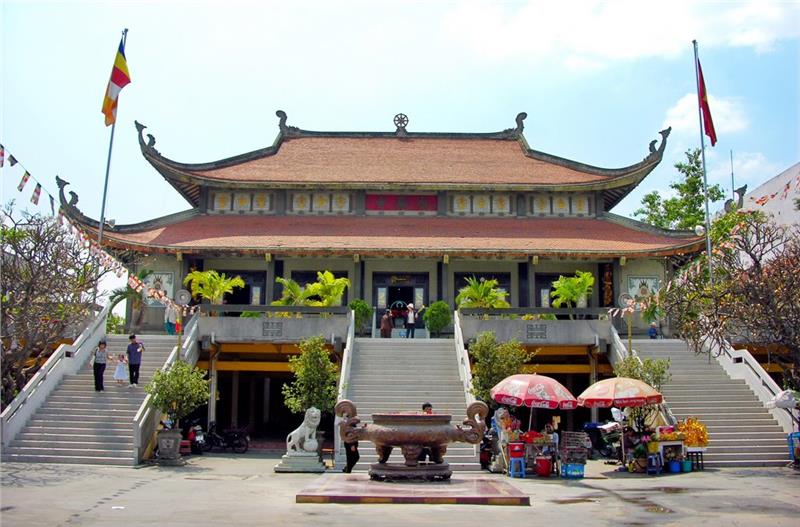
Deeply setting foot on the pagoda's campus, tourists will have a chance to admire the tower of Avalokitesvara. The 7-storey tower is situated on the right of the pagoda with the height of nearly 40m. Tourists can find it easy to contemplate the tower from afar. The tower owns the square shape with each side of the bottom 6m long. Top of the tower consists of 9 round-shaped wheels and round cubes. It is the most massive tower in Ho Chi Minh City pagodas in particular and pagodas in Vietnam in general. There is also a Community Sarira tower on the right of the pagoda. The 4-storey tower 25 meters high was built in 1982 and completed in 1984. The tower was built under fairly unique architectural style. There is a stair leading upwards from the courtyard. It is home to store the ash containers of the dead bodies which their relatives held at the pagoda. Discovering unique features of the towers and the architectural overall of the pagoda will be one of the most impressive things to do in Ho Chi Minh City.
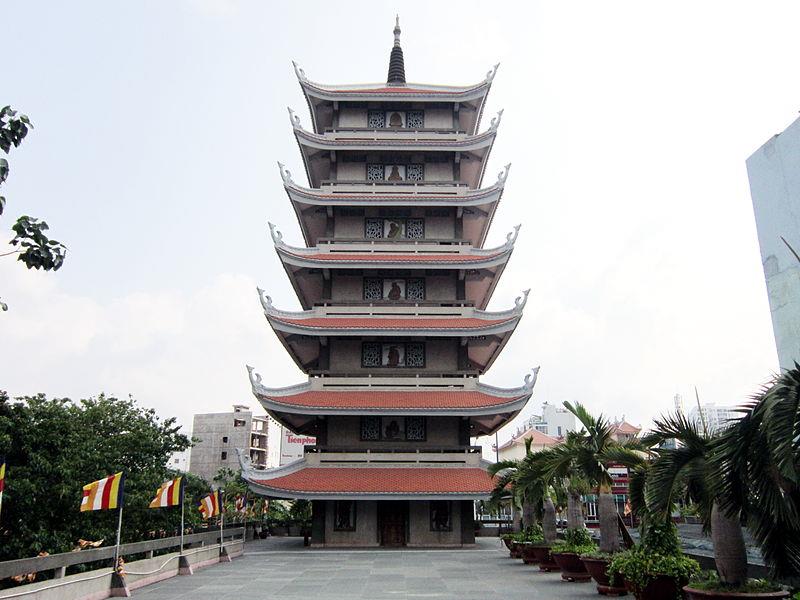
One of the towers promoting Vinh Nghiem Pagoda to become one of the unique Ho Chi Minh City attractions is Vinh Nghiem stone tower. The tower was inaugurated in November 2003. The 14 meter high tower is home to worship Venerable Thich Thanh Kiem, one of the two monks founding the pagoda. The tower is located at the relatively harmonious position in the overall of massive architecture of Vinh Nghiem Pagoda, which is adjacent the steeple on the left and symmetric with Avalokitesvara tower on the right. It is considered as the first stone tower in the South and also the largest and highest stone tower in Vietnam. The tower was built entirely of stone. The 7-storey tower is located among the square stone handrail 9.5 m long in each side. Vinh Nghiem tower retains a pair of large dragon, 27 pairs of small dragon and majestically curled phoenix wings. It is also impossible to count the number of lotus, waves, linden leaves, bats, couplets, mantras... on other 6 storey of the tower.
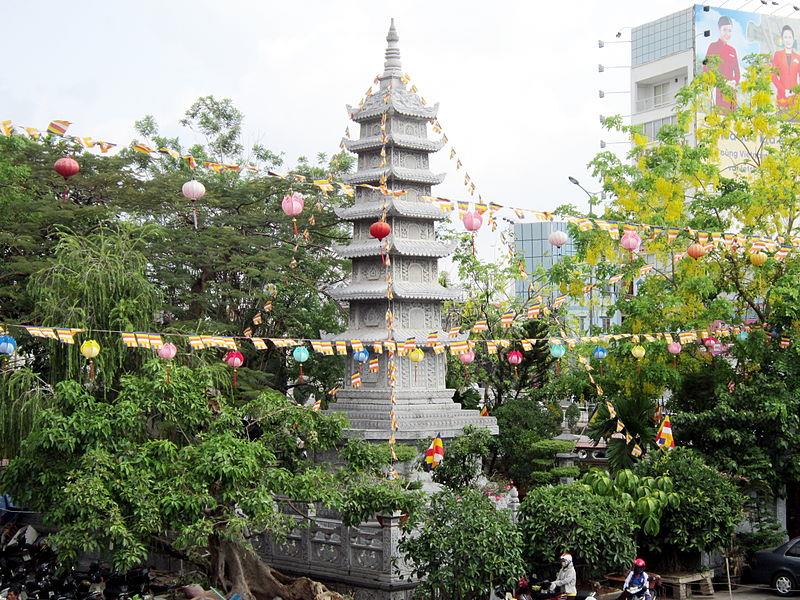
The center area includes a ground floor and a first floor. The ground floor is divided into ancestral worshiping house, lecture hall, office, library, classroom, monk room etc... There are 3 wide staircases leading to the upper floor from the courtyard consisting of the Buddha Sanctum and terrace. The terrace is about 10 meters wide with a bell tower on the right. The corners of the tiled roofs are curved under the architecture of pagoda in the North. The sanctum is a magnificent building 35 m long, 22 m wide and 15 m high. All of pillars, rafters and tiled roofs are casted with reinforced concrete. It is home to worship Buddha Shakyamuni in the middle, Manjushri Bodhisattva on the left and Samantabhadra Bodhisattva on the right. The wooden carved artworks here include 4 sacred animals, 9 dragon and especially, the reliefs on the altar engraving notable throughout the country and Asian countries.
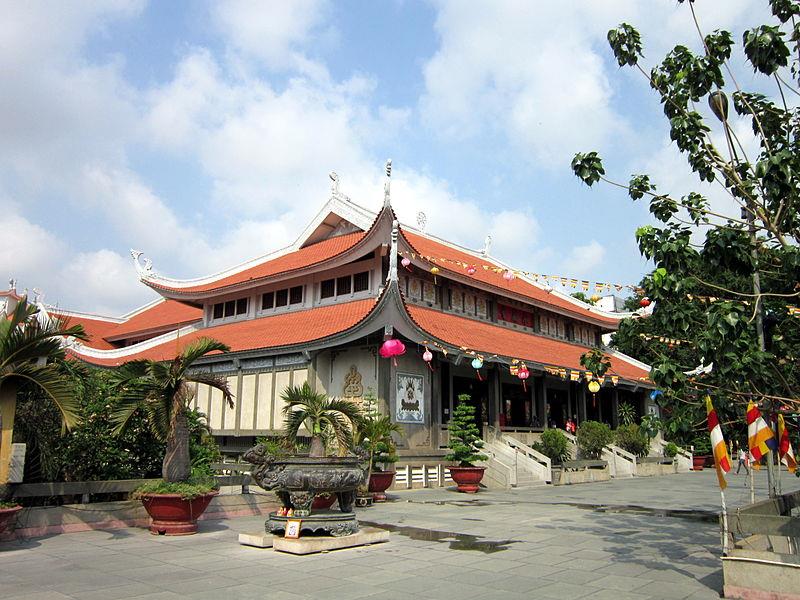
The breakthrough in architecture at Vinh Nghiem Pagoda is the use of concrete materials and reinforcement in a completely new structure compared to the previous pagodas. This structure gives the appearance of steadiness for the pagoda. All details seem to beautify the majesty. Vinh Nghiem Pagoda deserves to be the must-see tourist site in Ho Chi Minh City tours. It displays its important contribution in promoting Ho Chi Minh tourism closer to domestic and international tourists.
